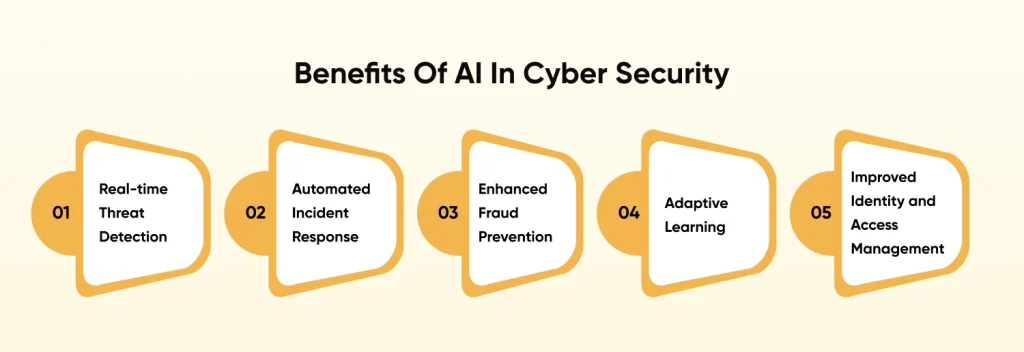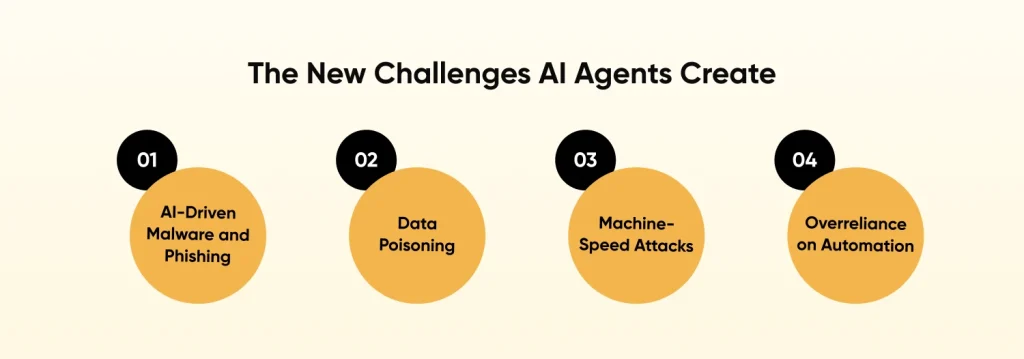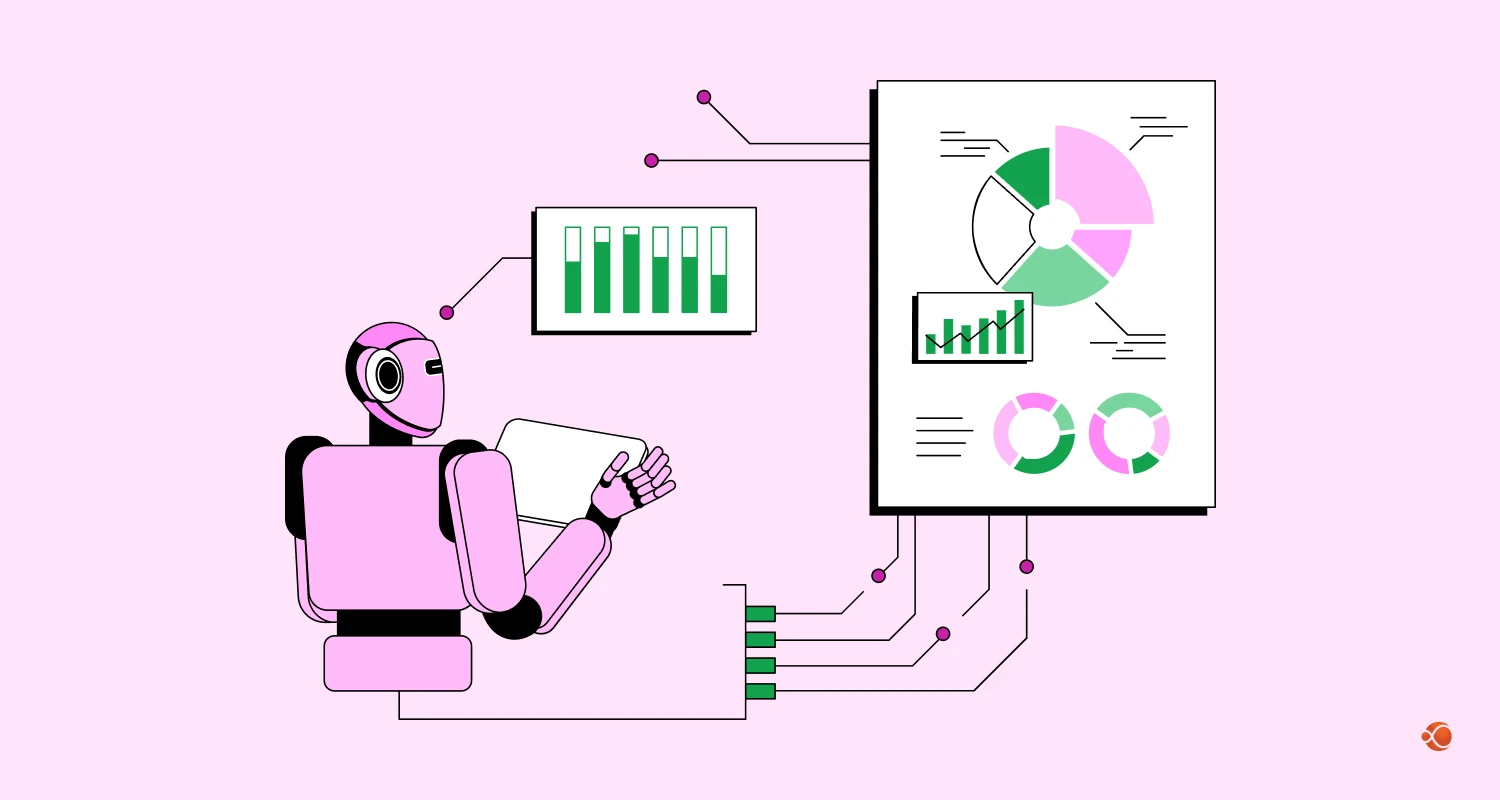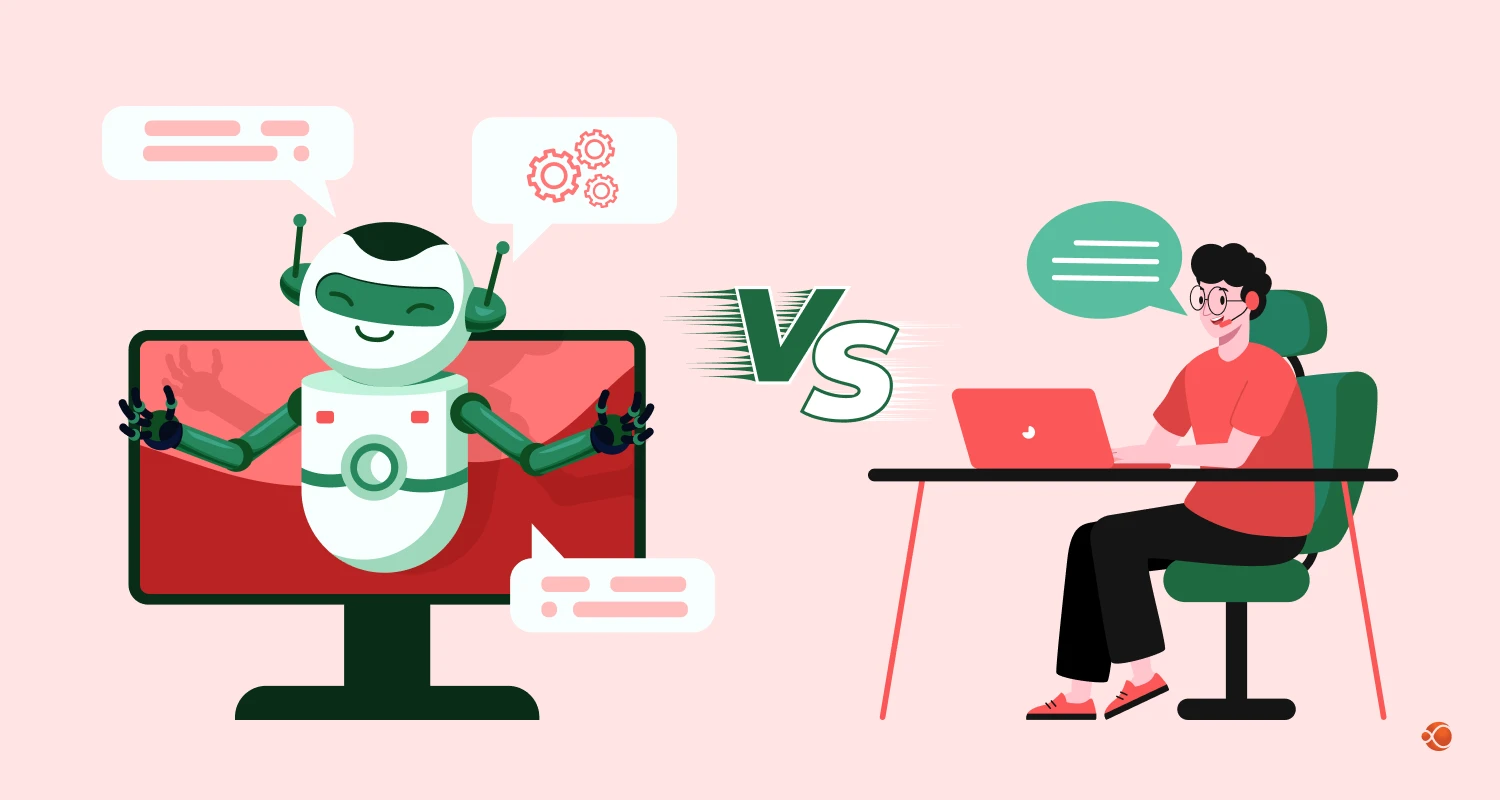Quick Summary: AI agents for cybersecurity are reshaping how businesses defend against modern threats. They bring speed, intelligence, and automation to security operations, but also introduce challenges like AI-powered malware and machine-speed attacks. This dual impact is pushing tech giants to reinvent cybersecurity strategies for the AI era.
The rise of AI agents has significantly affected the digital world. It has brought forth some incredible growth opportunities for enterprises, while redefining the very fabric of business operations. These intelligent, autonomous systems are pushing the boundaries of basic automation. It is shaping how companies create value, interact with customers, and manage complex workflows. They are the drivers of the new “AI agent economy” where focus is given to speed, efficiency, and data-driven decision-making.
This shift however has arrived with a critical trade-off. Global companies are integrating AI agents for cybersecurity deeply into their enterprise infrastructure. This is also introducing unprecedented security risks, which is forcing a fundamental reinvention of cybersecurity to protect a world that is now run by intelligent machines.
The Dual-Edged Sword: Impact of AI Agents on Cybersecurity
AI agents are a double-edged sword for cybersecurity. They can be our greatest ally, or they can be a new weapon in the hands of an attacker. Understanding both sides is the first step to building a truly effective defense.
Benefits Of AI In Cyber Security

AI agents offer some serious advantages for making our cybersecurity stronger by bringing speed, scale, and intelligence to the fight against cyber threats. In fact, organizations that make extensive use of security AI and automation save an average of $1.9 million on the cost of a data breach compared to those that don’t, according to IBM’s 2025 Cost of a Data Breach Report.
Real-time Threat Detection:
AI agents have the ability to examine enormous amounts of network traffic and login activity through to application usage, in a manner unfeasible to human beings.
By detecting even the slightest anomalies or smallest deviations from expected patterns, they are able to identify and indicate potential threats in real-time, before they can do any harm. This is a massive improvement over older systems that used a “known threats” list because of which they used to fail frequently to detect new or zero-day attacks.
Automated Incident Response:
When a threat shows up, the AI jumps into action. It can block the attack, isolate affected systems, or stop harmful files. Acting fast like this helps reduce damage.
Enhanced Fraud Prevention:
Another benefit of AI in cybersecurity comes from the ability of AI agents to detect fraudulent activities. They can scan through billions of transactions and user behaviours and learn to differentiate between legitimate and fraudulent activities.
This can be very beneficial for financial institutions and e-commerce companies looking to safeguard their customer assets and sensitive data.
Adaptive Learning:
Traditional security systems worked reactively when an issue was raised, since they could be pre-configured for all known potential errors and attacks. An AI-powered security system is always learning, analyzing new attacks, and adapting to evolving techniques used by cybercriminals, to update its own rules and models.
Improved Identity and Access Management:
AI agents are able to verify a user’s identity beyond traditional username and passwords. They can analyze the user behaviour, such as their typing speed, location, and time of the day they log in. Having access to so many contextual parameters help improve detection and prevention of unauthorized access.
The New Challenges AI Agents Create

Like every major technological leap, AI agents open up amazing opportunities but they also introduce complex cybersecurity challenges. As attackers get more advanced, security teams are up against threats that are smarter, faster, and far tougher to spot than before.
AI-Driven Malware and Phishing
Attackers are leveraging AI to improve the accuracy and capabilities of their attacks. For instance, an attacker can configure an AI powered malware program that can change its code on the fly to comply to bypass fraud detection rules, and phishing campaigns are easy to hyper-AI-Powered Malware and Phishing
Attackers are employing AI to make their assaults many times more sophisticated. For instance, AI-based malware can alter its code on the fly in order to evade detection, and phishing attacks can be hyper-targeted and deployed at huge scale, rendering them incredibly believable and hard for individuals to detect.
Data Poisoning
An AI system is only as effective as the training data. Slightly evil folks could deliberately tarnish the data upon which a security AI would be trained, thus making it “blind” to some forms of attacks or leading it to flag legitimate activity as a threat. This effectively instills a backdoor vulnerability within the defense system itself.
Machine-Speed Attacks
The most problematic aspect of the threat AI agents cause for cybersecurity is the speed of these attacks. AI-driven attacks can quickly scan vulnerabilities and launch various exploit attacks in just milliseconds. This can get overwhelming for human security teams to keep up with such attacks. To defend against such rapid attacks, companies need to rely on cybersecurity solutions that can work as fast, and are powered by automated AI agents
Overreliance on Automation
The promise of full automation is tempting, but it comes with a major risk. If we rely on AI agents without adequate human oversight, we create blind spots. A flawed AI decision or a novel attack that the AI doesn’t understand could lead to a system-wide failure, with no human in a position to intervene.
How Enterprises Are Reinventing Cybersecurity in AI Era
Big tech companies and enterprises are realising the transformative potential to build an Agentic SaaS platform. But they are also aware of the inherent risks of this AI agent era, and hence have introduced modern-day cybersecurity strategies and are investing in AI-driven innovation solutions as well:
Investment in AI-Driven Security Platforms
All the leading organizations from different industries are investing in building secure software development solutions that are powered by AI. These aren’t just a collection of tools, they are building unified systems that provide a holistic view of security, allowing businesses to benefit from intelligent responses across all their digital assets.
Building AI-Powered Threat Intelligence Networks
AI is being used to significantly enhance threat intelligence gathering and analysis. They process massive amounts of data from different sources like security feeds, social media, and at times dark web forums too. This way AI agents for cybersecurity are able to identify emerging threats and track attacker tactics. This enables a more proactive approach towards security, reducing the impact and depth of any breaches.
Integration of AI Agents in Cloud Security
With more and more companies shifting their operations to the cloud, the need to secure such environments has become imperative. Top technology firms are now integrating AI agents into cloud security software with the help of reliable AI software development services. The agents assist in identifying threats more quickly, auto-scan for compliance, and adapt security controls accordingly. They’re designed specifically to identify threats specific to cloud-based systems.
Collaboration with Governments and Industry Bodies
The fight against AI-powered threats is more complicated than traditional threats. It requires a proper collaboration between companies, governments, and big industry groups to share the threat data and build a common standard guideline on cybersecurity for AI. It works as a collective defense mechanism against a common enemy.
Focus on Explainability and Ethical AI
For AI to work well in security, people need to trust it. That’s why tech companies are focusing on explainable AI. This means AI systems don’t just make decisions, they can also show a human analyst why they made them. Being able to understand these choices helps security teams build smarter and more ethical defenses.

How Leading Companies Are Applying AI in Cybersecurity
Most big technology companies are not just using AI to improve their product capability, but they are taking special steps by redesigning their security philosophies around it. Here are some of the most transformational and noteworthy AI agents for cybersecurity by the industry leaders:
Microsoft: Security Copilots and AI-First Defense
Microsoft is making enterprise AI agents for cybersecurity, front and center of its defense strategy with Security Copilot. The product allows security analysts to ask complicated questions in plain, easy-to-understand language and receive immediate, actionable responses from an ocean of data. It’s having a high-level security professional in your corner all the time, freeing up people to tackle the most difficult threats.
Google: AI Red Teams and Model Safety
Google is taking the challenge head-on by employing AI Red Teams, teams of specialists who simulate the hackers, testing Google’s own AI systems to the breaking point to identify and patch vulnerabilities before the adversaries do. They also created the Secure AI Framework (SAIF) to enable organizations to bake security into their AI systems from the ground up, rather than as an afterthought.
Amazon: GuardDuty and AI-Aware Cloud Security
With so many businesses running on AWS, Amazon is focused on cloud security for the AI era. Tools like Amazon GuardDuty are now “AI-aware,” designed to spot unusual behavior from AI agents that might signal a compromise. Their approach is to provide scalable, easy-to-use defenses that protect the entire AI workflow, from start to finish.
IBM: IBM Security QRadar
IBM Security QRadar helps businesses spot and respond to security threats quickly. It uses AI cybersecurity tools to detect unusual activities and highlight the most serious risks. IBM’s X-Force team also makes use of AI to provide timely insights into emerging threats.
Best Practices for Businesses Adopting AI Agents in Cybersecurity
If you are looking to adopt agentic AI cybersecurity solutions, you need to follow the below mentioned best practices to ensure there’s positive impact of AI agents on cybersecurity of your project:
- Keep a Human-in-the-Loop Oversight: AI is a powerful tool, but it should be a partner, not a replacement. Your security team should be trained to work with these systems, not just rely on them.
- Test AI Models Against Adversarial Attacks: Just like you’d test any piece of software, you need to test your AI models against real-world adversarial attacks. This is especially important for AI agents for online shopping where customer data is at stake.
- Strengthen Data Governance and Access Controls: AI is only as good as the data it’s trained on. It is therefore very important to invest in proper data governance and access control services to safeguard your models from attacks and being compromised.
- Prioritize Continuous Monitoring and Updating: The threat landscape is always changing. Your AI models and your security team needs to constantly update, learn,and adapt to stay ahead.
- Educate Security Teams on AI-Driven Risks: Hire AI developers who are aware and informed about the specific risks and challenges often associated with AI-powered cyberattacks. They should know how to use agentic AI in cybersecurity, how they work, their limitations, and ability to collaborate with such smart systems.
The Future of Cybersecurity in the AI Agent Era
Autonomous Security Operations Centers (SOCs)
Security operations are automated. AI agents now detect, analyze, and respond to threats with minimal human involvement. Yet human beings must still make high-level decisions and address unusual or advanced attacks.
Predictive Defense Over Reactive Measures
AI has the ability to scan enormous amounts of data and recognize patterns that individuals might not even notice. That creates the possibility for security teams to stop attacks before they happen, rather than simply react after the attack has taken place.
Regulation and Compliance as Imperative Drivers
As AI-driven cybersecurity tools become more important, governments and global regulators are stepping up rules to make sure AI is used safely and responsibly. Organizations will increasingly rely on AI consulting services to navigate these complex regulatory landscapes.
Human–AI Collaboration as the Core Model
The strongest cyber defense solution is combining the strengths of AI processing and human intellect. AI can help dig deeper into the problem, with speed, volume, and in-depth analysis, whereas humans can use those tools to provide judgement, strategy, and context.
Final Words
AI is revolutionizing cybersecurity on a big scale. It helps discover threats earlier, respond automatically, and adapt to combat new threats. But it also comes with its own set of challenges, including new types of attacks and ethics concerns. Technology companies are investing in AI platforms, advancing worldwide threat intelligence, and making AI more accessible and trustworthy through generative AI integration services.
For businesses, the key is using AI responsibly. That means combining automation with human oversight, testing AI against possible attacks, working with data carefully, and training groups to handle emerging threats. The future of cybersecurity depends on human beings and intelligent systems working together. AI, when done properly, can make the digital universe safer for business and people alike.
FAQs For AI Agents For Cybersecurity
What Areas of Cybersecurity Do AI Agents Impact Most?
AI agents have the greatest impact in threat detection and response, analyzing network events in real-time to identify sophisticated attacks that traditional systems miss. Identify and access management sees major improvements through AI’s behavioural analysis and contextual verification beyond passwords. Fraud prevention is the third key area, where AI excels at detecting suspicious transactions by analyzing user behaviour patterns with speed and accuracy.
How Can Businesses Adopt AI-Based Cybersecurity Solutions Cost-Effectively?
Start with a cloud-based AI security platform that eliminates infrastructure costs while providing enterprise-grade protection through subscription models. Implement in phases, beginning with email security and endpoint protection before expanding network-wide to demonstrate early ROI.
What Are the Future Trends in AI-Driven Cybersecurity Strategies?
Autonomous security operation centers will function with minimal human intervention, using AI for routine threat detection while humans handle strategy. Predictive defense models will replace reactive approaches, with AI analyzing threat intelligence to prevent attacks before they occur. Zero-trust architecture orchestrated by AI will become standard, continuously verifying users, devices, and transactions across networks.
Can AI Agents Really Revolutionize Cybersecurity?
AI agents are transforming cybersecurity as they process threats at machine speed, with organizations recording decreased breach cost and response times. The revolution is human-AI collaboration where humans offer strategic guidance and AI takes care of automation. This makes defenses evolve continuously as AI learns and adapts, which makes cybersecurity more effective against changing threats.
What Do the Future Implications of AI in Cybersecurity Look Like?
AI will democratize state-of-the-art cybersecurity by enabling enterprise-level protection for smaller organizations through cost-effective, automated tools. An AI arms race will be sparked between attackers and defenders, fueling ongoing innovation in offensive and defensive capabilities. Regulatory frameworks will adapt to necessitate organizations reconciling automation benefits with compliance obligations and human oversight responsibilities.







